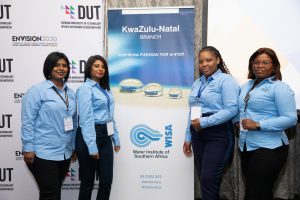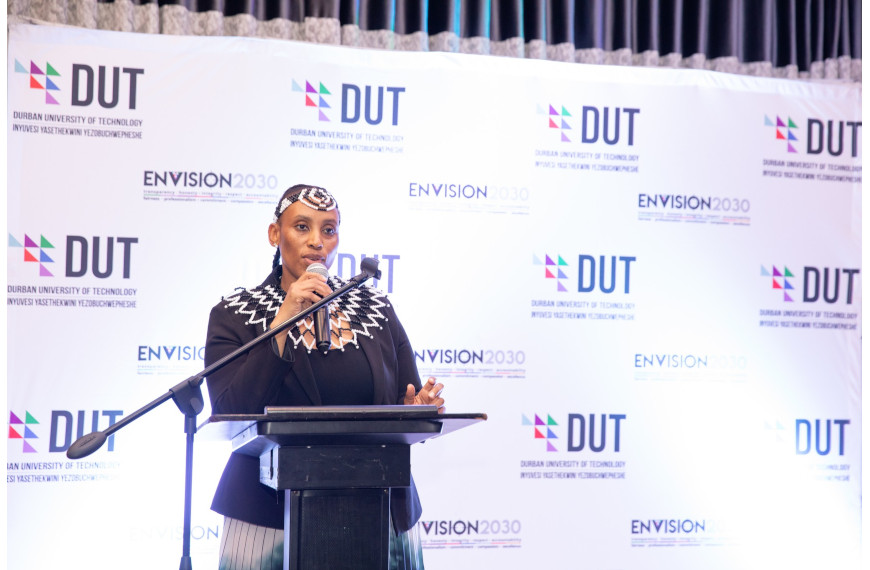The Durban University of Technology (DUT) recently played host to the Water Institute of Southern Africa (WISA) KwaZulu-Natal (KZN) Bridging the Academia Industry Gap Symposium which was held at Coastlands Musgrave Hotel.
Delivering the opening remarks and setting the symposium context on global megatrends and impact on the water and sanitation sector workforce was DUT’s Acting Deputy Dean: Faculty of Engineering and the Built Environment, Dr Nomcebo Mthombeni. She thanked all the partners in terms of organising this important event, especially DUT’s Co-operative Education, partners from academia, partners from industry partners as well as from government.
“I think what is really in store is the eagerness and willingness for us in trying to bridge the silos because I think all of us have innovative solutions. We see the wonderful works that we each have and done in our own spaces. And I think in terms of the vision that we have, so that in a small or big way, we could be able to make an impact collectively. I think with the team that we have it’s really possible for us to work together, so I’m really grateful,” she said.
She then spoke of the KwaZulu-Natal floods, a trend that has been happening for a while that is also stressing South Africa’s infrastructure and posed the question on how does one go about preparing for it?
“We have been dealing with an ageing infrastructure, climate change and inequality in terms of access to water and; how are we adapting as a country in terms of this knowledge trends that we are seeing, is that we need to make sure that we are adapting to a sustainable future. So, I am alluded to the fact that there is a mismatch between academia and industry needs and skills gap. And, often you find that graduates are not fully equipped with practical skills that they need in the industry sector. The vision is how to bridge this gap and forge partnerships between academia and industry that will speak to us in terms of how we develop our country,” she said.
 Adding to the conversation was WISA’s 2024 Conference Chair, Mr Mnguni, Chairperson of the 2024 WISA Conference who emphasised that everyone has a role to play in order to bridge the gap. “We are the ones who need to find the solutions we are facing in the water sector, ” he said.
Adding to the conversation was WISA’s 2024 Conference Chair, Mr Mnguni, Chairperson of the 2024 WISA Conference who emphasised that everyone has a role to play in order to bridge the gap. “We are the ones who need to find the solutions we are facing in the water sector, ” he said.
The second session of the seminar looked at industry needs where there were guided discussions on the current status of the water and sanitation sector industry workforce and drivers of change. The Water Research Commission ‘s Dr Jennifer Molwantwa gave insight into the South African water sector research objectives, and funding for innovation and implementation. She said that the purpose of her presentation is to indicate that there is significant, existing scientific information that could be helpful in solving the current and expected problems within the water and sanitation space “We are also looking at new research and scientific information that is needed in order to enable us to solve these problems in our country. We entail to improve water security through improved management of water resources and the use of new technologies, but also focus on explaining, communicating as well as educating water managers, decision makers and members of the public of what we do. The water challenges are very many, but a simple explanation or a simple solution would just be looking at trying to solve a simple challenge such as just plugging the leaks,” she stressed.
She further added that everyone need to be making sure that they utilise and conserve the resources that they have and also that there is a dire need to find new ways of managing the resources to ensure that there is sustainable water availability into the future.
Dr Molwantwa explained that the vision of the Water Research Commission is to have innovative water solutions through research and development for South Africa, Africa and the world. She then looked at the role of science and innovation which is premised on the key strategic challenges that are facing the water sector globally.
“We have been going around consulting our stakeholders finding out what are the real needs, what are the real challenges and through that we crafted our research questions in order to be able to come up with new ideas,” she said.
She further relayed that their key focus is also aimed at being inclusive, where they are drawing on the strength and intelligence as well as the skills of human youth cooperatives, environmental groups, as well as people living with disabilities.
Other topics for the day included on key industry trends, as well as on the private sector-workforce requirements and future trends.
Further on into the programme, there were guided discussions on water sector structured programmes with TVET colleges. This was followed by the ‘bridging the gap’ session with presentations on the alignment of studies with industry needs and the implementation of innovative water and sanitation solutions, looking at suitable water sector industries in terms of an academia collaboration model.
The session concluded with session reflections and closing remarks with academia and industry aiming to continue working closely together to find solutions to bridge the gap between industry and academia.
Pictured: DUT’s Acting Deputy Dean: Faculty of Engineering and the Built Environment, Dr Nomcebo Mthombeni.
Pictured: WISA delegates at the events.
Waheeda Peters

